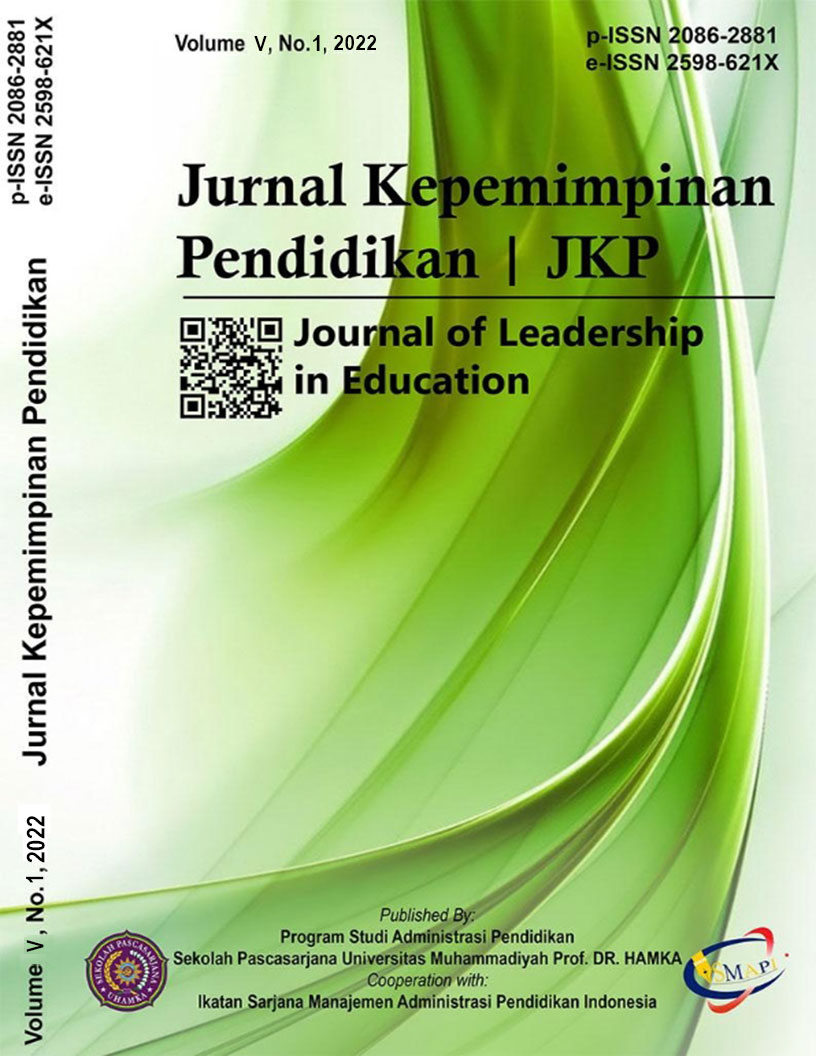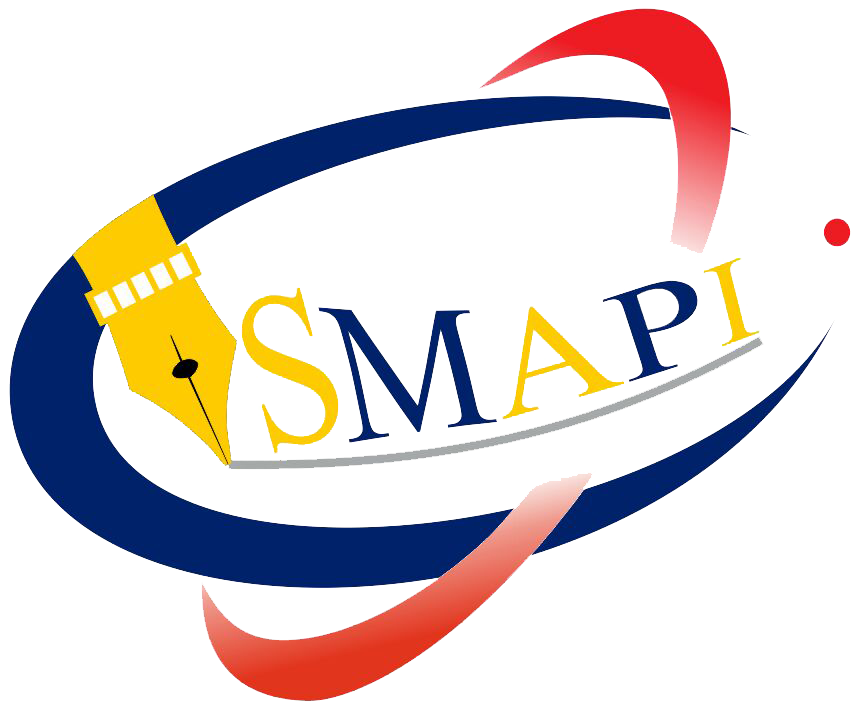EVALUATION OF IMPLEMENTATION STUDENT SKILL COMPETENCY ASSESSMENT OFFICE ADMINISTRATION
DOI:
https://doi.org/10.22236/jkpuhamka.v5i1.9232Keywords:
student skill competency assessment, office administration, CIPPAbstract
This evaluation aimed to determine the context of implementation student skill competency assessment office administration at Dharma Karya Vocational High School, South Jakarta, the readiness of students, educators and education personnel, financing, facilities and infrastructure, the process of implementing the assessment, and knowing the achievement of program implementation. The method used in this evaluation is descriptive qualitative method by taking empirical data and facts, and the model used is the CIPP model (Contex, Input, Process, Product). Data collection was carried out scientifically which included observation, structured interviews, and documentation. Interviews were conducted with the Principal, Deputy Head of Curriculum, Deputy Head of Facilities and Infrastructure, Head of Office Administration Department, Chair of the Examination Committee, Internal Examiners, External Examiners, and students. Then the data obtained were analyzed using the triangulation method of sources, display data, and conclusions. The conclusion of the evaluation research, that the background for the activity of student skill competency assessment at the Dharma Karya Vocational High School, South Jakarta, is the existence of a Government policy towards Vocational High Schools that are in accordance with environmental needs and the vision and mission of the school.
Downloads
References
Arikunto, Suharsini. 2005. Dasar-Dasar Evaluasi Pendidikan Edisi Revisi. Jakarta : Bumi Ngalim.
Bol, T., van de Werfhorst, H.G., 2011. Signals and closure by degrees: the education effect across 15 European countries. Res. Soc. Stratif. Mobil. 29 (1), 119–132.
Child, S. F., & Shaw, S. D. (2020). A purpose-led approach towards the development of competency frameworks. Journal of Further and Higher Education, 44(8), 1143-1156.
Choi, S.J., Jeong, J.C., Kim, S.N., 2019. Impact of vocational education and training on adult skills and employment: an applied multilevel analysis. Int. J. Educ. Dev. 66, 129–138.
Deutscher, V., & Winther, E. (2018). Instructional sensitivity in vocational education. Learning and instruction, 53, 21-33.
Forster, A.G., Bol, T., 2018. Vocational education and employment over the life course using a new measure of occupational specificity. Soc. Sci. Res. 70, 176–197.
Ghani, Abdul Rahman A. 2014. School Action Research Methods. Jakarta: PT. Rajagrafindo Persada.
Ghani, Abdul Rahman A.2014. Metode Penelitian Tindakan Sekolah. Jakarta : PT. Rajagrafindo Persada.
Grosemans, I., & De Cuyper, N. (2021). Career competencies in the transition from higher education to the labor market: Examining developmental trajectories. Journal of Vocational Behavior, 128, 103602.
Guo, D., Wang, A., 2020. Is vocational education a good alternative to low-performing students in China. Int. J. Educ. Dev. 75, 102187.
Hidayatno, A., Destyanto, A.R., Hulu, C.A., 2019. Industry 4.0 technology implementation impact to industrial sustainable energy in Indonesia: a model conceptualization. Energy Proc. 156, 227–233.
Latief, Abdul Madjid. 2014. Evaluasi Kinerja Sumber Daya Manusia (Konsep, Alpikasi, Standar dan Penelitian). Jakarta : Haja Mandiri.
Latief, Abdul Madjid. 2014. Performance Evaluation of Human Resources (Concept, Application, Standards and Research). Jakarta: Haja Mandiri.
Loon, M., Lim, Y. M., Lee, T. H., & Tam, C. L. (2012). Transformational leadership and job"related learning. Management Research Review.
Maragkou, K., 2020. Socio-economic inequality and academic match among post-compulsory education participants. Econ. Educ. Rev. 79, 102060.
Moleong , Lexy. J. 2011. Metode Penelitian Kualitatif. Bandung : PT. Remaja Rosdakarya
Moleong, Lexy. J. 2011. Qualitative Research Methods. Bandung: PT. Rosdakarya youth
Muja, A., Blommaert, L., Gesthuizen, M., Wolbers, M.H.J., 2019. The vocational impact of educational programs on youth labor market integration. Res. Soc. Stratif. Mobil. 64, 100437.
Mulder, M. (2014). Conceptions of professional competence. In International handbook of research in professional and practice-based learning (pp. 107-137). Springer, Dordrecht.
Neilson, J., Dwiartama, A., Fold, N., Permadi, D., 2020. Resource-based industrial policy in an era of global production networks: strategic coupling in the Indonesian cocoa sector. World Dev. 135, 105045.
Nilsson, A., 2010. Vocational education and training”an engine for economic growth and a vehicle for social inclusion?: vocational education and training. Int. J. Train. Dev. 14 (4), 251–272.
Ocampo, A.C.G., Reyes, M.L., Chen, Y., Restubog, S.L.D., Chih, Y.-Y., Chua-Garcia, L., Guan, P., 2020. The role of internship participation and conscientiousness in developing career adaptability: a five-wave growth mixture model analysis. J. Vocat. Behav. 120, 103426.
Quiroga-Garza, M.E., Flores-Marín, D.L., Cantú-Hernandez, R.R., Era~na Rojas, I.E., Lopez Cabrera, M.V., 2020. Effects of a vocational program on professional orientation. Heliyon 6 (4), e03860.
Rahman, A. bt A., Hanafi, N., Binti, M., Mukhtar, M. bt I., Ahmad, J. bin, 2014. Assessment practices for competency based education and training in vocational college, Malaysia. Proc. Soc. Behav. Sci. 112, 1070–1076.
Salleh, K.M., Sulaiman, N.L., Mohamad, M.M., Sern, L.C., 2015. Academia and practitioner perspectives on competencies required for technical and vocational education students in Malaysia: a comparison with the ASTD WLP competency model. Proc. Soc. Behav. Sci. 186, 20–27.
Sugiyono. 2011. Metode Penelitian Kuantitatif, Kualitatif, dan R&D. Bandung: ALFABETA, cv.
Sugiyono. 2011. Quantitative Research Methods, Qualitative, and R & D. Bandung: ALFABETA, cv.
Winther, E., Klotz, V.K., 2013. Measurement of vocational competences: an analysis of the structure and reliability of current assessment practices in economic domains. Emp. Res. Vocat. Educ. Train. 5 (1), 2.
Xie, X., Xie, M., Jin, H., Cheung, S., Huang, C.-C., 2020. Financial support and financial well-being for vocational school students in China. Child. Youth Serv. Rev. 118, 105442.
Yusuf, Muti 2014. Metode Penelitian, Kuantitatif, Kualitatif & Penelitian Gabungan. Jakarta : Prenada Media Group.
Yusuf, Muti 2014. Research Methods, Quantitative, Qualitative & Combined Research. Jakarta: Prenada Media Group.















